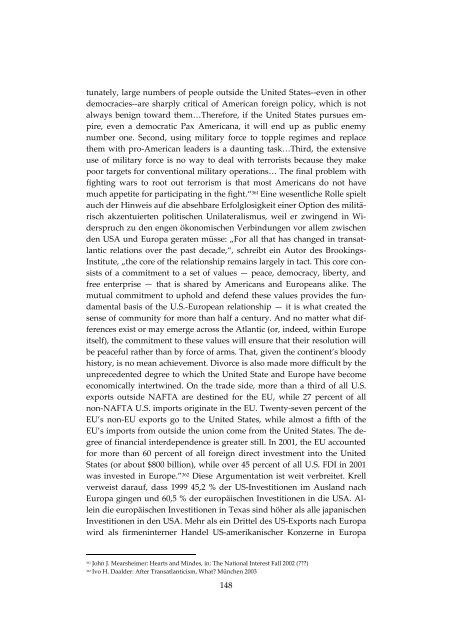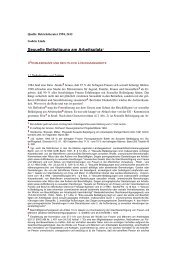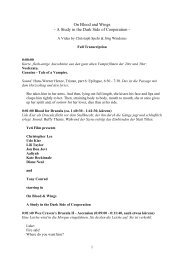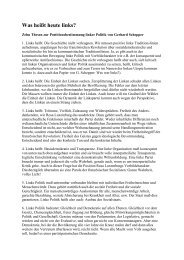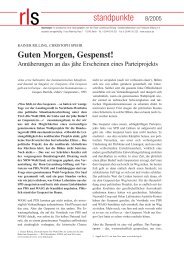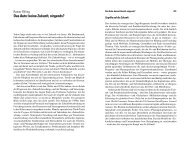outbreak. let's take over. american empire als wille ... - Rainer Rilling
outbreak. let's take over. american empire als wille ... - Rainer Rilling
outbreak. let's take over. american empire als wille ... - Rainer Rilling
Sie wollen auch ein ePaper? Erhöhen Sie die Reichweite Ihrer Titel.
YUMPU macht aus Druck-PDFs automatisch weboptimierte ePaper, die Google liebt.
tunately, large numbers of people outside the United States--even in other<br />
democracies--are sharply critical of American foreign policy, which is not<br />
always benign toward them…Therefore, if the United States pursues <strong>empire</strong>,<br />
even a democratic Pax Americana, it will end up as public enemy<br />
number one. Second, using military force to topple regimes and replace<br />
them with pro-American leaders is a daunting task…Third, the extensive<br />
use of military force is no way to deal with terrorists because they make<br />
poor targets for conventional military operations… The final problem with<br />
fighting wars to root out terrorism is that most Americans do not have<br />
much appetite for participating in the fight.“ 361 Eine wesentliche Rolle spielt<br />
auch der Hinweis auf die absehbare Erfolglosigkeit einer Option des militärisch<br />
akzentuierten politischen Unilateralismus, weil er zwingend in Widerspruch<br />
zu den engen ökonomischen Verbindungen vor allem zwischen<br />
den USA und Europa geraten müsse: „For all that has changed in transatlantic<br />
relations <strong>over</strong> the past decade,“, schreibt ein Autor des Brookings-<br />
Institute, „the core of the relationship remains largely in tact. This core consists<br />
of a commitment to a set of values — peace, democracy, liberty, and<br />
free enterprise — that is shared by Americans and Europeans alike. The<br />
mutual commitment to uphold and defend these values provides the fundamental<br />
basis of the U.S.-European relationship — it is what created the<br />
sense of community for more than half a century. And no matter what differences<br />
exist or may emerge across the Atlantic (or, indeed, within Europe<br />
itself), the commitment to these values will ensure that their resolution will<br />
be peaceful rather than by force of arms. That, given the continent’s bloody<br />
history, is no mean achievement. Divorce is <strong>als</strong>o made more difficult by the<br />
unprecedented degree to which the United State and Europe have become<br />
economically intertwined. On the trade side, more than a third of all U.S.<br />
exports outside NAFTA are destined for the EU, while 27 percent of all<br />
non-NAFTA U.S. imports originate in the EU. Twenty-seven percent of the<br />
EU’s non-EU exports go to the United States, while almost a fifth of the<br />
EU’s imports from outside the union come from the United States. The degree<br />
of financial interdependence is greater still. In 2001, the EU accounted<br />
for more than 60 percent of all foreign direct investment into the United<br />
States (or about $800 billion), while <strong>over</strong> 45 percent of all U.S. FDI in 2001<br />
was invested in Europe.” 362 Diese Argumentation ist weit verbreitet. Krell<br />
verweist darauf, dass 1999 45,2 % der US-Investitionen im Ausland nach<br />
Europa gingen und 60,5 % der europäischen Investitionen in die USA. Allein<br />
die europäischen Investitionen in Texas sind höher <strong>als</strong> alle japanischen<br />
Investitionen in den USA. Mehr <strong>als</strong> ein Drittel des US-Exports nach Europa<br />
wird <strong>als</strong> firmeninterner Handel US-amerikanischer Konzerne in Europa<br />
361<br />
John J. Mearsheimer: Hearts and Mindes, in: The National Interest Fall 2002 (???)<br />
362<br />
Ivo H. Daalder: After Transatlanticism, What? München 2003<br />
148


